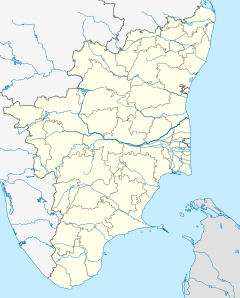| Erumbeeswarar Temple | |
|---|---|
 View from the foothills | |
| Religion | |
| Affiliation | Hinduism |
| District | Trichy |
| Deity | Erumbeeswarar(Shiva) Narun Kuzhal Nayagi (Parvathi) |
| Location | |
| Location | Thiruverumbur |
| State | Tamil Nadu |
| Country | India |
| Geographic coordinates | 10°47′34″N 78°46′3″E / 10.79278°N 78.76750°E |
| Architecture | |
| Type | Dravidian architecture |
| Website | |
| http://erumbeeswararkovil.in | |
Erumbeeswarar Temple in Thiruverumbur, Tamil Nadu, India, is a Hindu temple dedicated to the deity Shiva. Built on a 60-foot (18 m) tall hill, it is accessible via a flight of steps. The temple's main shrines and its two prakarams (outer courtyards) are on top of the hill, while a hall and the temple tank are located at the foothills. Shiva is believed to have transformed himself into an ant hill and tilted his head at this place to enable ants to climb up and worship him. Erumbeeswarar is revered in the canonical 7th-century Tamil Saiva work the Tevaram, written by Tamil saint poets known as nayanmars and classified as Paadal Petra Sthalam.
The temple is one in a series built by Aditya Chola (871-907 CE) along the banks of river Cauvery, to commemorate his victory in the Tirupurambiyam Battle. It has several inscriptions from the Chola Empire dating back to the 10th century.[1] The temple has been declared a protected monument by the Archaeological Survey of India and is locally referred as "Kailash of South India".[2] The temple has six daily rituals at various times from 5:30 am to 8:00 pm, and three yearly festivals in its calendar. The annual Brahmotsavam (prime festival) is attended by thousands of devotees from far and near.[3] Every full moon, tens of thousands of pilgrims worship Erumbeeswarar by circumambulating the hill barefoot in a practice called girivalam. The temple is maintained and administered by the Hindu Religious and Endowment Board of the Government of Tamil Nadu.
